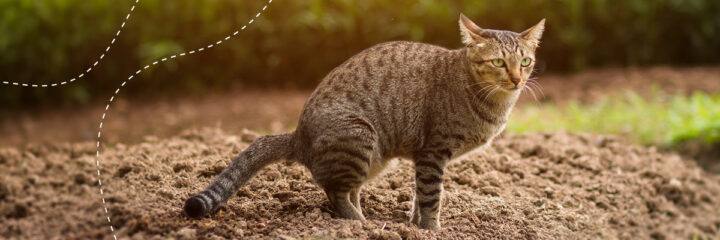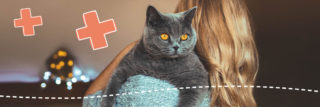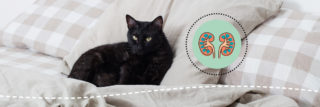
Cats with CKD suffer not only from the consequences of diseased kidneys but also from the effects of the gut-kidney axis. This involves the gut microbiota, which is the totality of bacteria, viruses and protozoa that live in the gut. Uraemic toxinsToxic, nitrogen-containing urinary substances responsible for uraemia and kidney damage.... such as indoxyl sulphate frequently disturb the balance of these microbes, resulting in a dysbiosisImbalance of organisms of the the microbiome (all microbes on or within an animal’s tissues), for instance the imbalance of the intestinal flora as part of the microbiome...., an imbalance of the microbes. It can also cause a disturbance in the frequency, consistency, and appearance of stools (for example, constipation can make stools harder and darker in colour). Constipation can occur due to various reasons such as dehydrationA deficit of total body water. Dehydration can be caused by excessive fluid loss, for instance via the kidneys in CKD, or by insufficient fluid intake.... resulting from CKD, diabetes or hyperthyroidism. Other possibilities include nerve damage, pelvic fractures, or pain due to arthrosis/arthritis.
Reduced kidney function – reduced intestinal activity
Poor digestion in cats with CKD has multiple causes. Firstly, damaged kidneys are no longer able to regulate electrolytesElectrolytes are substances that produce an electrically conducting solution when dissolved in water, releasing mineral ions such as sodium, potassium, chloride and calcium. These ions can either be the positively or negatively charged or, combined as a salt, neutral.... finely, resulting in an imbalanced electrolyte level. Some electrolytes accumulate, such as phosphate and calcium, while others are no longer available to the body in sufficient quantities, such as potassium and magnesium. A potassium deficiency, in particular, can lead to reduced intestinal activity.
Dehydration can cause constipation
Cats with CKD may also become dehydrated due to excessive water loss through the kidneys. The glomeruli, which are the filter units of the nephronsNephrone sind die Filtereinheiten der Nieren...., initially filter out water generously. Since most of the substances to be excreted are water-soluble, a lot of water is required to filter them. Subsequently, 99% of the filtered water is recovered in the tube system of the nephrons. In cases of CKD where there are insufficient functioning tube systems, not enough water can be recovered and is lost through urine. The body compensates by extracting more water from the large intestine, which can cause constipation due to the thickening of feed mash.
Constipation can also be caused by feed additives used to bind phosphate, such as those based on calcium carbonate or aluminium compounds, as well as antihypertensives. A 2022 study found that cats with CKD have a reduced tendency to excrete compared to healthy cats. They typically defecate only once a day, if at all.
Intestinal sluggishness caused by indoxyl sulphate
It has been argued that the uraemic toxin, indoxyl sulphate, has a direct effect on colonic activity by causing intestinal hypomotility. The consequence is that the feed slurry remains in the large intestine (=colon) for a very long time and then thickens as water is removed. On the other hand, tryptophan (an essential amino acid) from the mash is broken down by gut bacteria to form indole (protein breakdown by colonic bacteria). Indoxyl sulphate is formed from indole in the liver. Longer passage through the large intestine gives the gut bacteria more opportunity to form indole. This in turn produces more indoxyl sulphate, creating a vicious circle. This is further supported by the fact that dysbiosis favours those types of bacteria that break down proteins in the large intestine. These include the bacteria mentioned above, which convert tryptophan to indole, producing more indoxyl sulphate.
Unfavourable microbes produce unfavourable fatty acids
The protein degradation caused by the dysbiosis and the types of bacteria it favours also lead to increased production of fatty acids in the colon, of which the branched short-chain isovaleric acid (IVA) has an inhibitory effect on the large intestinal musculature. The increased formation of IVA in CKD cats can also have negative effects in terms of intestinal sluggishness, resulting in constipation and increased indole formation.
What can be done about constipation?
Constipation can cause abdominal pain and discomfort in cats. In one of the studies mentioned above, constipated cats were given intravenous fluids, enemas and/or lactulose, a sugar compound derived from lactose, which not only softens stools but also stimulates bowel activity. Faster intestinal transit means fewer proteins are available for microbial digestion by gut bacteria, so studies in mice have also been able to reduce indoxyl sulphate. Some experts, such as Professor Jessica M. Quimby of Ohio State University, recommend that such products (laxatives such as lactulose, other stool softeners or fibre) should not be used in CKD cats, or used for long periods of time. Because they draw water from the cat’s already dehydrated body into the colon, causing the cat to lose even more fluid.
Bibliography:
- Benjamin, S.E. & Drobatz, K.J. (2020). Retrospective evaluation of risk factors and treatment outcome predictors in cats presenting to the emergency room for constipation. Journal of Feline Medicine and Surgery, Vol. 22(2), S. 153–160.
- Blakeney, B.A., Crowe, M.S., Mahavadi, S., Murthy, K.S., & Grider, J.R. (2019). The Branched Short Chain Fatty Acid Isovaleric Acid Causes Colonic Smooth Muscle Relaxation via cAMP/PKA Pathway. Dig Dis Sci. 2019 May ; 64(5), S. 1171–1181.
- Jones, S.E., Quimby, J.M., Summers, S.C., Adams, S.MA., Caney, S.M., & Rudinsky, A.J (2022): Survey of defecation habits in apparently healthy and chronic kidney disease cats. Journal of Feline Medicine and Surgery, Vol. 24(2), S. 131–141
- Sueyoshi, M., Fukunaga,M., Mei, M., Nakajima, A., Tanaka, G., Murase, T., Narita, Y., Hirata, S. & Kadowaki, D. (2019): Effects of lactulose on renal function and gut microbiota in adenine- induced chronic kidney disease rats, Clinical and Experimental Nephrology,23, S.: 908–919.
- Summers, S. C., Quimby, J.M., Philips, R.K., Stockman, J., Isaiah, A., Lidbury, J.A., Steiner, J.M. & Suchodolski, j. (2019): Preliminary evaluation of fecal fatty acid concentrations in cats with chronic kidney disease and correlation with indoxyl sulfate and p-cresol sulfate. J Vet Intern Med, 2020 Jan;34(1), S. 206-215.
- Summers, S. C., & Quimby, J. M. (2023). The feline gut-kidney axis: food for thought. Veterinary Focus, 33(1). https://vetfocus.royalcanin.com/en/scientific/the-feline-gut-kidney-axis-food-for-thought


